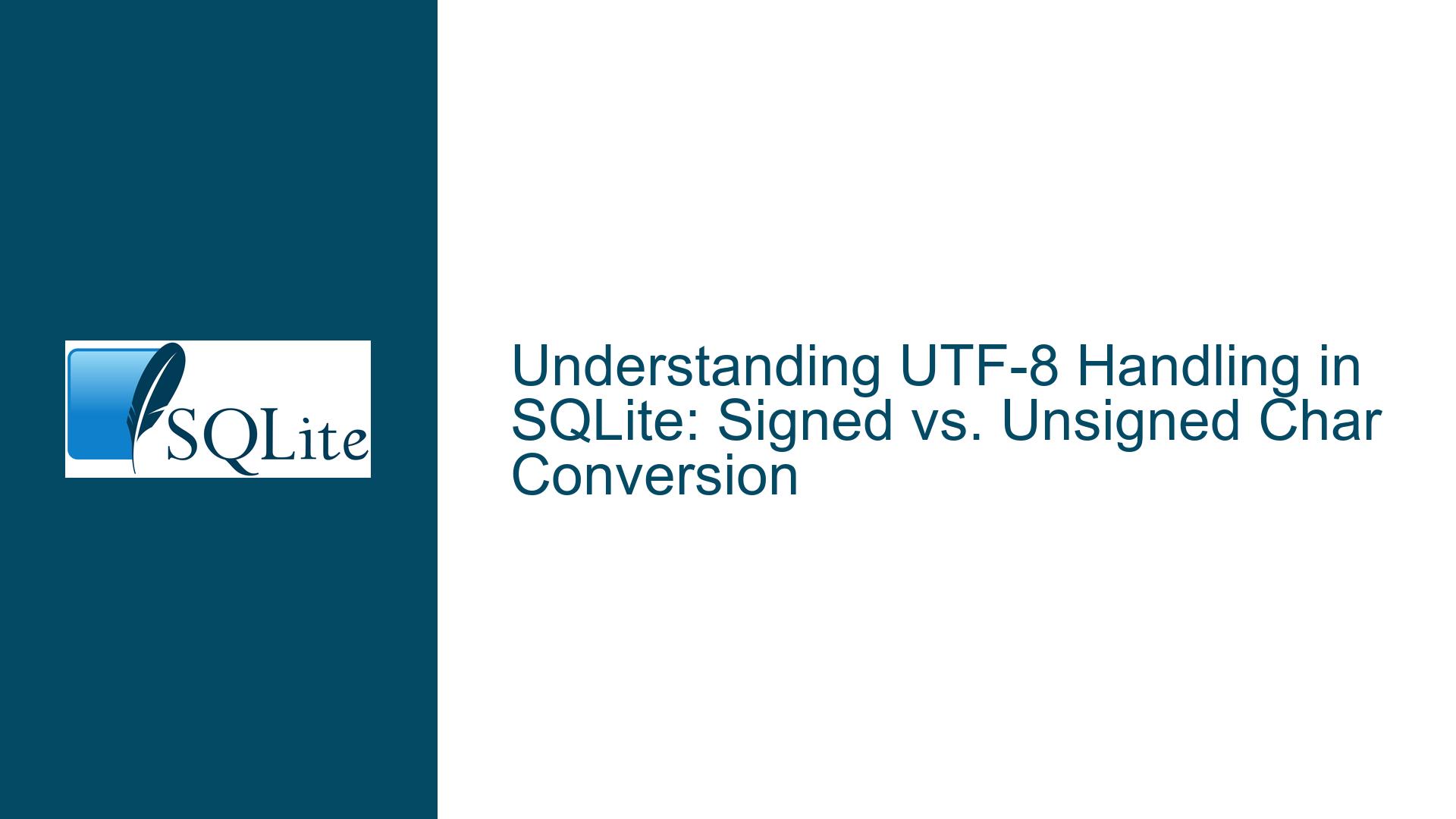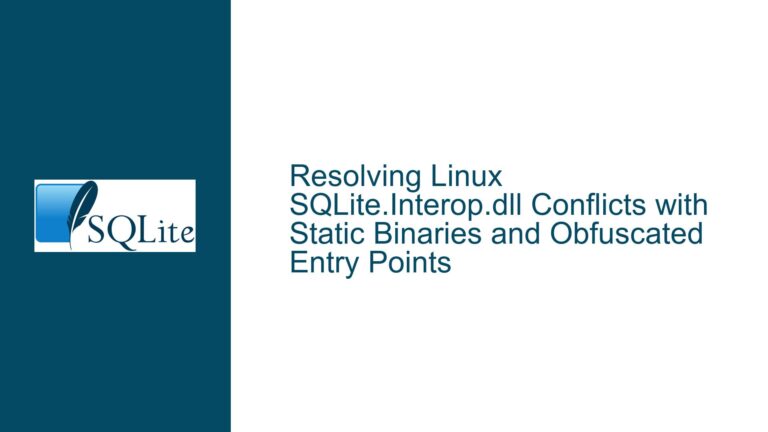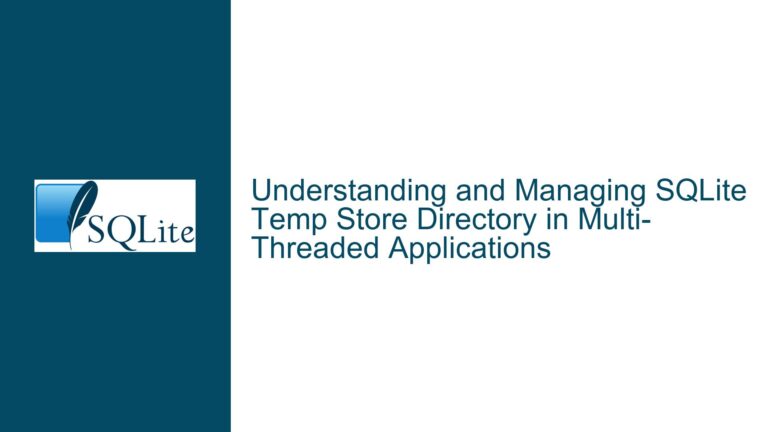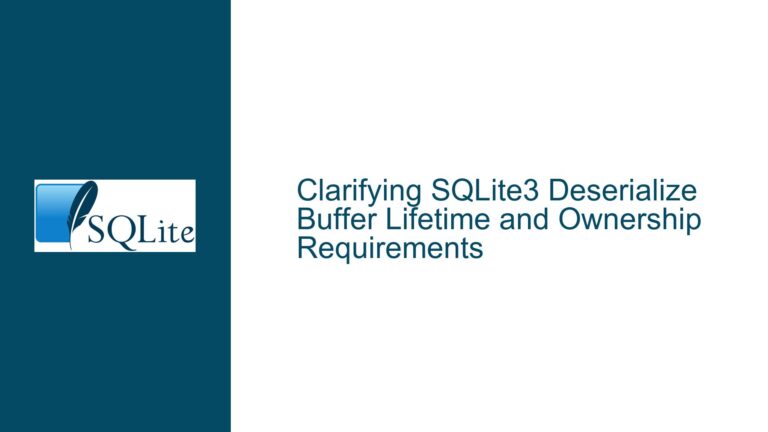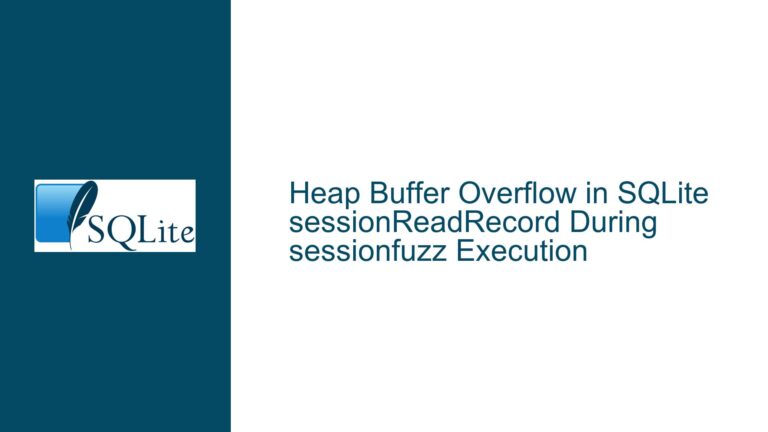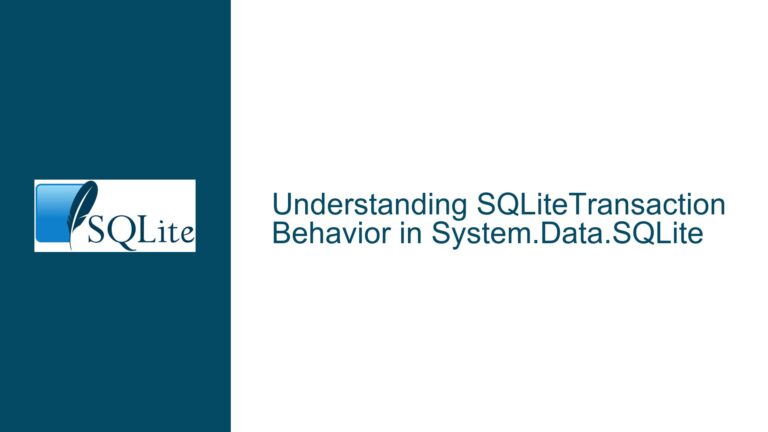UTF-8 Handling in SQLite: Signed vs. Unsigned Char Conversion
UTF-8 Encoding and SQLite’s Internal Handling
UTF-8 is a variable-width character encoding that uses one to four bytes to represent Unicode characters. In SQLite, UTF-8 strings are manipulated extensively, especially when binding text to prepared statements or retrieving text from query results. The SQLite API uses char* for input parameters (e.g., sqlite3_bind_text) and unsigned char* for output parameters (e.g., sqlite3_column_text). This distinction is not arbitrary but rooted in the nuances of C/C++ type handling and the requirements of UTF-8 processing.
The char type in C/C++ is implementation-defined and can be either signed or unsigned, depending on the platform. On some platforms, such as ARM, char is unsigned by default, while on others, like x86, it is signed. This variability can lead to subtle bugs when performing arithmetic or comparison operations on UTF-8 encoded bytes, as the interpretation of the byte values changes based on their signedness.
In UTF-8, bytes with values greater than or equal to 0xC0 (192 in decimal) are used to indicate the start of a multi-byte sequence. When processing UTF-8 strings, SQLite must correctly identify these lead bytes and skip over the subsequent continuation bytes (which have values between 0x80 and 0xBF). If char is signed, a byte with the value 0xC0 would be interpreted as -64 in two’s complement representation, which complicates comparisons and arithmetic operations. For example, the condition (*z >= 0xC0) would always evaluate to false if z is a signed char* and 0xC0 is treated as a signed value.
To avoid these issues, SQLite internally converts char* input to unsigned char* when processing UTF-8 strings. This ensures that byte values are interpreted consistently as unsigned integers, regardless of the platform’s default signedness for char. The SQLITE_SKIP_UTF8 macro, which is used to skip over multi-byte UTF-8 sequences, relies on this unsigned interpretation to function correctly.
Platform-Defined Char Signedness and Undefined Behavior
The signedness of the char type is platform-dependent, which introduces variability in how UTF-8 bytes are interpreted. On platforms where char is signed by default, arithmetic operations on char values can lead to undefined behavior if those values fall outside the range of a signed char (-128 to 127). For example, adding 1 to a char with the value 127 results in an overflow, which is undefined behavior in C/C++. This is particularly problematic when processing UTF-8 strings, as many byte values fall outside the signed range.
By using unsigned char* internally, SQLite avoids these issues. Unsigned arithmetic is well-defined for all byte values (0 to 255), and comparisons behave as expected. For instance, the condition (*uz >= 0xC0) in the SQLITE_SKIP_UTF8 macro works correctly because uz is an unsigned char*, and 0xC0 is treated as an unsigned value.
The conversion from char* to unsigned char* is not a data conversion but a reinterpretation of the byte values. The underlying data remains unchanged; only the type used to access it changes. This reinterpretation ensures that the compiler generates the correct instructions for arithmetic and comparison operations, regardless of the platform’s default signedness for char.
Optimizing UTF-8 Processing with Unsigned Char
The use of unsigned char* in SQLite’s UTF-8 processing is not merely a defensive measure but also an optimization. By ensuring that byte values are interpreted consistently as unsigned integers, SQLite can use simpler and more efficient code for UTF-8 manipulation. For example, the SQLITE_SKIP_UTF8 macro relies on the fact that continuation bytes in UTF-8 have values between 0x80 and 0xBF. If char were used instead of unsigned char, additional checks would be required to handle the signedness of the byte values, complicating the code and potentially reducing performance.
The suggestion to replace the SQLITE_SKIP_UTF8 macro with a version that uses char* and checks for values less than -64 is problematic for several reasons. First, it assumes that char is signed, which is not guaranteed. Second, it relies on undefined behavior when performing arithmetic on signed values outside their valid range. Third, it complicates the logic for identifying UTF-8 lead and continuation bytes, making the code harder to understand and maintain.
Instead, SQLite’s approach of using unsigned char* internally provides a robust and efficient solution. It ensures that UTF-8 processing works correctly on all platforms, regardless of the default signedness of char, and avoids undefined behavior. The conversion from char* to unsigned char* is a small price to pay for the benefits of consistent and reliable UTF-8 handling.
Conclusion
The distinction between char* and unsigned char* in SQLite’s UTF-8 handling is a deliberate design choice that addresses the challenges posed by platform-dependent signedness of the char type. By converting char* input to unsigned char* internally, SQLite ensures that UTF-8 processing is consistent, reliable, and efficient across all platforms. This approach avoids undefined behavior, simplifies the code, and provides a robust foundation for handling UTF-8 encoded text in SQLite.
Understanding this distinction is crucial for developers working with SQLite’s C/C++ API, as it highlights the importance of type handling in low-level string manipulation. By adhering to these principles, SQLite maintains its reputation as a lightweight, high-performance database engine with robust support for internationalized text.
